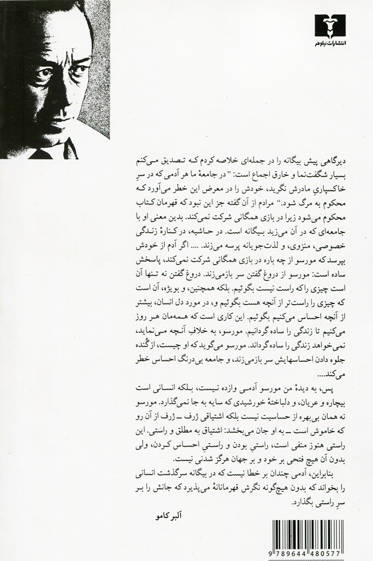بیگانه
کتاب بیگانه، در سال 1942 انتشار یافته است. از پس زمینه و جان مایه ی رمان بیگانه ، اغلب به عنوان مثالی از فلسفه ی ابزورد و هستی گرایانه ی کامو یاد شده است؛ گرچه خود او، اگزیستانسیال بودن این اثر را رد کرده است. شخصیت اصلی کتاب، یک مرد فرانسوی/الجزایری بی تفاوت به نام مورسو است که با عباراتی چون «شهروند رام شده ی فرانسه در آفریقای شمالی» و «مرد مدیترانه ای» توصیف شده است؛ هرچند مورسو به ندرت از فرهنگ سنتی مدیترانه بویی برده و در آن سهیم می شود. او در مراسم خاک سپاری مادرش حضور می یابد و چند روز بعد، مردی عرب را که درگیر تنازعی با یکی از دوستانش بوده، در الجزیره ی تحت اشغال فرانسوی ها به قتل می رساند. مورسو محاکمه و به اعدام محکوم می شود. داستان به دو بخش قبل و بعد از قتل تقسیم شده و به صورت اول شخص، توسط شخصیت اصلی روایت می شود. کتاب بیگانه، چهار بار به زبان انگلیسی و همچنین به زبان های متعدد دیگری ترجمه شده و یکی از برترین آثار کلاسیک قرن بیستم به حساب می آید. روزنامه ی لوموند فرانسه، رمان بیگانه را در در رتبه ی نخست صد کتاب برتر قرن قرار داده است.
Once there was a ruler called Sisyphus who ruled over the kingdom of present-day Corinth. He made the kingdom prosperous but was known for his treacherous rule. He killed the guests and travelers in his kingdom for his sadistic pleasure and it went against the tradition of hospitality in Ancient Day Greece. This angered Zeus and thus he sent the god of death to banish him to the Underworld. He tricked the God of Death by chaining him in his own shackles. Death Stopped during that time and no one died on Earth, wars ended up with soldiers turning up just fine. Ares, the God of War intervened because wars weren’t “fun” anymore.
Zeus tried again where he got Sisyphus to Underworld, where he was greeted by Persephone. He complained to her that he hadn’t received a proper funeral and hence would like to come back only after he got one. Sisyphus of course didn’t keep his promise and kept on living. Zeus then took matters into his own hands and brought Sisyphus in front of him. His punishment was simple, he had to roll a massive boulder over a hill. It seemed simple at first but the boulder just rolled down again, making him repeat this action for eternity.
According to several people, this is a metaphor for the changing day and night cycles. But according to Albert Camus, this rolling up a boulder up a hill is familiar to what we experience in our daily lives. Sometimes, the things we do daily might seem mundane and absurd but it is similar to Sisyphus. It might seem like that the absurdity of life is to end when you end with this task or that task, but we fail to realize that we have to continue this for eternity. We still persevere and give a significant amount of time to it, so we must just accept this condition of ours.
Such is the philosophy of this article’s author: Albert Camus







